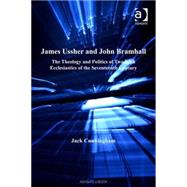James Ussher And John Bramhall
, by Cunningham, Jack- ISBN: 9780754655664 | 0754655660
- Cover: Hardcover
- Copyright: 2/1/2007
This book provides a comparative study of the theologies and politics of two leading seventeenth century ecclesiastics, James Ussher (1581-1656) and John Bramhall (1594-1663). The works, thoughts and careers of these two important figures in the English and Irish established churches are analysed in parallel to examine the religious differences and similarities between the two men.This book examines the lives of two leading Irish ecclesiastics, James Ussher (1581-1656) and John Bramhall (1594-1663). Both men were key players in the religious struggles that shook the British Isles during the first half of the seventeenth century, and their lives and works provide important insights into the ecclesiastical history of early modern Europe.As well as charting the careers of Ussher and Bramhall, this study introduces an original and revealing method for examining post-Reformation religion. Arguing that the Reformation was stimulated by religious impulses that pre-date Christianity, it introduces a biblical concept of 'Justice' and 'Numinous' motifs to provide a unique perspective on ecclesiastical development. Put simply, these motifs represent on the one hand, the fear of God's judgement, and on the other, the sacred conception of the fear of God. These subtle understandings that co-existed in the Catholic church were split apart at the Reformation and proved to be separate poles around which different interpretations of Protestantism gathered. By applying these looser concepts to Ussher and Bramhall, rather than rigid labels such as Arminian, Laudian or Calvinist, a more subtle understanding of their careers is possible, and provides an altogether more satisfactory method of denominational categorisation than the ones presently employed, not just for the British churches but for the history of the Reformation as a whole.







